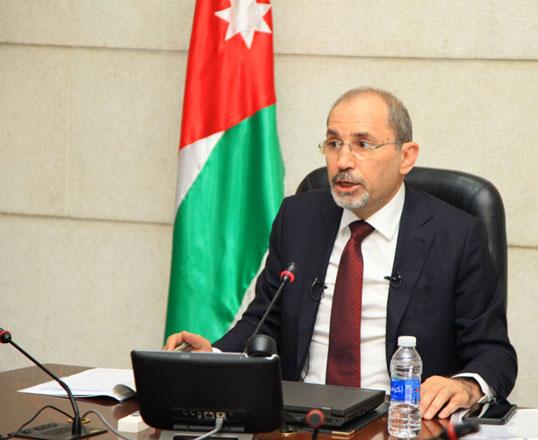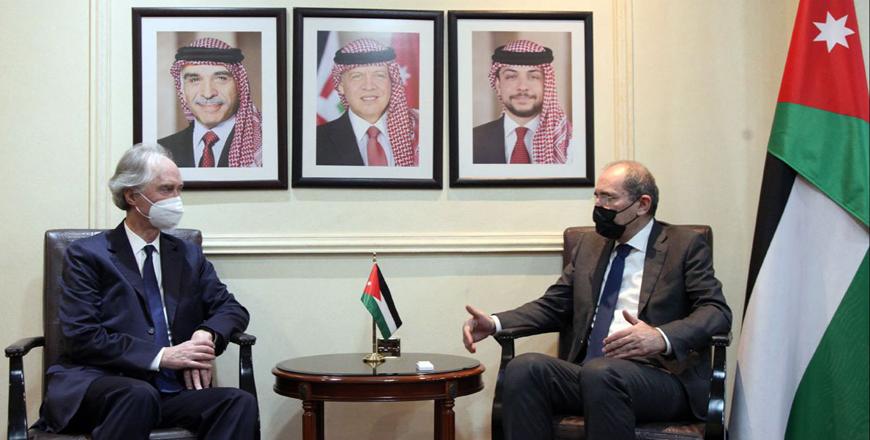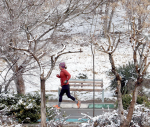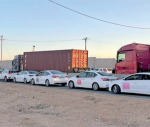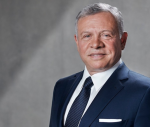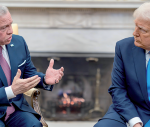You are here
Jordan calls for global fund for voluntary, safe return of Syrian refugees
By JT - Jun 16,2023 - Last updated at Jun 16,2023
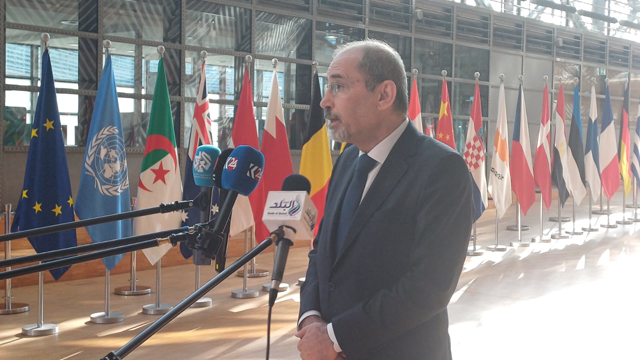
Deputy Prime Minister and Foreign Affairs Minister Ayman Safadi speaks to the media on the sidelines of Seventh Brussels Conference on the Future of Syria and the Region on Thursday (Petra photo)
AMMAN — The future of Syrian refugees lies in their homeland, Deputy Prime Minister and Foreign Affairs Minister Ayman Safadi said on Thursday, emphasising the need to invest in that future in Syria and build the necessary infrastructure to encourage the voluntary return of refugees.
Safadi cautioned against the repercussions of declining international support for refugees and their host countries, as well as the reduction in services provided by international organisations assisting refugees.
He emphasised that ensuring decent living conditions for refugees is an international responsibility, beyond the sole responsibility of host nations.
During his speech at the Seventh Brussels Conference on the Future of Syria and the Region, Safadi highlighted Jordan's role as the largest host country relative to its population and commended its approach in providing decent living conditions for Syrian refugees, offering them hope, opportunities and respect.
He also underscored the ongoing need for vital services to be sustained for refugees, which requires the international community to fulfill its obligations and provide the necessary support, according to a Foreign Ministry statement.
Acknowledging the significant burden borne by Jordan — as it hosts 1.3 million Syrian refugees — across crucial sectors such as education, healthcare, employment, water resources and energy, Safadi stressed that the country has surpassed its capacity and cannot continue to provide essential services to refugees without international assistance.
“International support for refugees is dwindling at dangerous rates. This year, international funding to our response plan stands at mere 6.8 per cent. Last year it stood at 33 per cent, compared with almost 70 per cent in 2016, you can see the trajectory,” he said, voicing alarm against the decrease in international support for Syrian refugees.
As head of the Jordanian delegation at the conference, accompanied by Minister of Planning and International Cooperation Zeina Touqan, Safadi called on the international community to fulfill its responsibilities towards refugees.
The deputy prime minister and foreign minister emphasised that the ultimate solution to the refugee issue lies in their voluntary return to Syria, noting “until then support for refugees must be provided at sufficient levels” and called for collaboration with host countries to determine spending priorities.
Furthermore, he advocated for the establishment of a global fund aimed at supporting the voluntary and safe return of refugees by rehabilitating the necessary infrastructure within Syria to facilitate that.
“Political stands must reflect reality. Whether under early recovery or stabilisation mechanism, or any other mechanism, basic services must be provided so refugees can return. It is in Syria, and not in host countries that the future of refugees lies. We must build for that future now,” he said.
During the conference, inaugurated by the UN High Representative for Foreign Affairs and Security Policy Josep Borrell, and featuring a recorded speech by the secretary-general of the United Nations, António Guterres, Safadi emphasised that “abandoning refugees to need and despair will not bode well for all of us”.
“Walls will not stop migration to Europe. Ending conditions that pushed refugees out of their homes so that they can return home, and providing refugees with the means to lead dignified lives in their immediate neighbourhood until the conditions are conducive for them to go home, will,” he said.
Safadi highlighted Jordan’s previous message to the Brussels conference, underscoring its commitment to fulfilling its responsibilities towards refugees in partnership with the international community, which also played an essential role.
He emphasised that if the international community and UN organisations fail to shoulder their responsibilities in addressing the refugee burden, Jordan alone cannot bear the weight of this responsibility. Safadi emphasised the need for burden-sharing, where everyone contributes their fair share.
“There is a limit to what we can do, and there is a limit to what should be expected of us to do,” he said, adding that a new crisis does not absolve the international community of the repercussions and responsibilities of previous crises.
Regarding education, Safadi mentioned that the official Jordanian education system accommodates approximately 155,000 Syrian students, necessitating the adoption of a two-shift system in schools. He expressed the country’s desire not to be compelled to choose between providing educational opportunities for Jordanian students or Syrian refugees.
Safadi emphasised the importance of collective Arab efforts, which emerged following the Jeddah and Amman meetings, in contributing to finding a political solution to the Syrian crisis, based on a step-by-step approach aligned with UN Resolution 2254.
He said that it is unacceptable for all parties to sit at the negotiation table for solving the crisis in Syria while the collective Arab role remains absent.
Safadi expressed gratitude to the EU and Borrell for organising the significant conference that reaffirms the collective responsibility for addressing the refugee crisis.
On the sidelines of the conference, Safadi met with deputy prime minister and minister of foreign affairs of Iraq, Fuad Hussein, and Lebanese Minister of Foreign Affairs and Expatriates Abdullah Bouhabib.
Safadi also held discussions with Borrell, emphasising the importance of the partnership between Jordan and the EU and addressing regional challenges.
Safadi and Touqan met with EU Commissioner for Neighbourhood Policy and Enlargement, Oliver Varhelyi, to discuss regional challenges and cooperation projects between Jordan and the European Union in vital sectors such as water, energy, education, and others.
Safadi expressed appreciation for the support provided by the EU to Jordan.
Additionally, Safadi and Toukan met UN Special Envoy to Syria Geir Pedersen, UN High Commissioner for Refugees Filippo Grandi, discussing efforts to resolve the crisis in Syria and the diminishing international support for Syrian refugees.
On the sidelines of the conference, Safadi held discussions with Japanese Minister of State for Foreign Affairs Kenji Yamada, reaffirming the strength of the friendly relations between the two countries and ways to implement the outcomes of His Majesty King Abdullah ‘s visit to Japan last April.
Safadi emphasised Jordan’s appreciation of the support provided by Japan to help Jordan overcome economic challenges and the regional crises’ impact on the Kingdom.
During the conference in Brussels, Safadi also met with representatives of civil society organisations participating in the event. He acknowledged their role and thanked them for their efforts in serving Jordan and its interests. He stressed the importance of civil society’s role and the value of exchanging ideas and continuous engagement.
In a press statement ahead of the Brussels Conference, Safadi highlighted a significant decline in international support for refugee-hosting countries.
He urged the international community to shoulder its responsibilities towards refugees, emphasising the need to “abandon outdated approaches” to resolving the crisis in Syria.
Jordan, known for hosting the largest number of refugees relative to its population, is home to 1.3 million Syrians who receive comprehensive services, he said.
“We would propose the establishment of a dedicated fund meant to create a secure environment for the refugees’ safe return,” he said.
Expressing concern over reduced assistance from UNHCR and the World Food Programme (WFP) in Jordan, Safadi said that the WFP is set to cease providing aid to hundreds of thousands of refugees, starting in September.
On the impact of the Syrian crisis on Jordan, the minister revealed that the Kingdom has witnessed the birth of 200,000 Syrians since the outbreak of the crisis.
Jordan’s schools are currently home to over 155,000 Syrian students, he said, adding “approximately 50 per cent of the Syrian population in Jordan is under the age of 15”.
Related Articles
AMMAN — Foreign Minister Ayman Safadi on Tuesday highlighted the role of international cooperation in addressing the refugee burden, especia
AMMAN — The growing danger of drug smuggling from Syria to Jordan and the challenges from hosting large number of refugees topped Deputy Pri
AMMAN — Deputy Prime Minister and Foreign Minister Ayman Safadi and UN Special Envoy to Syria Geir Pedersen on Wednesday stressed the import


